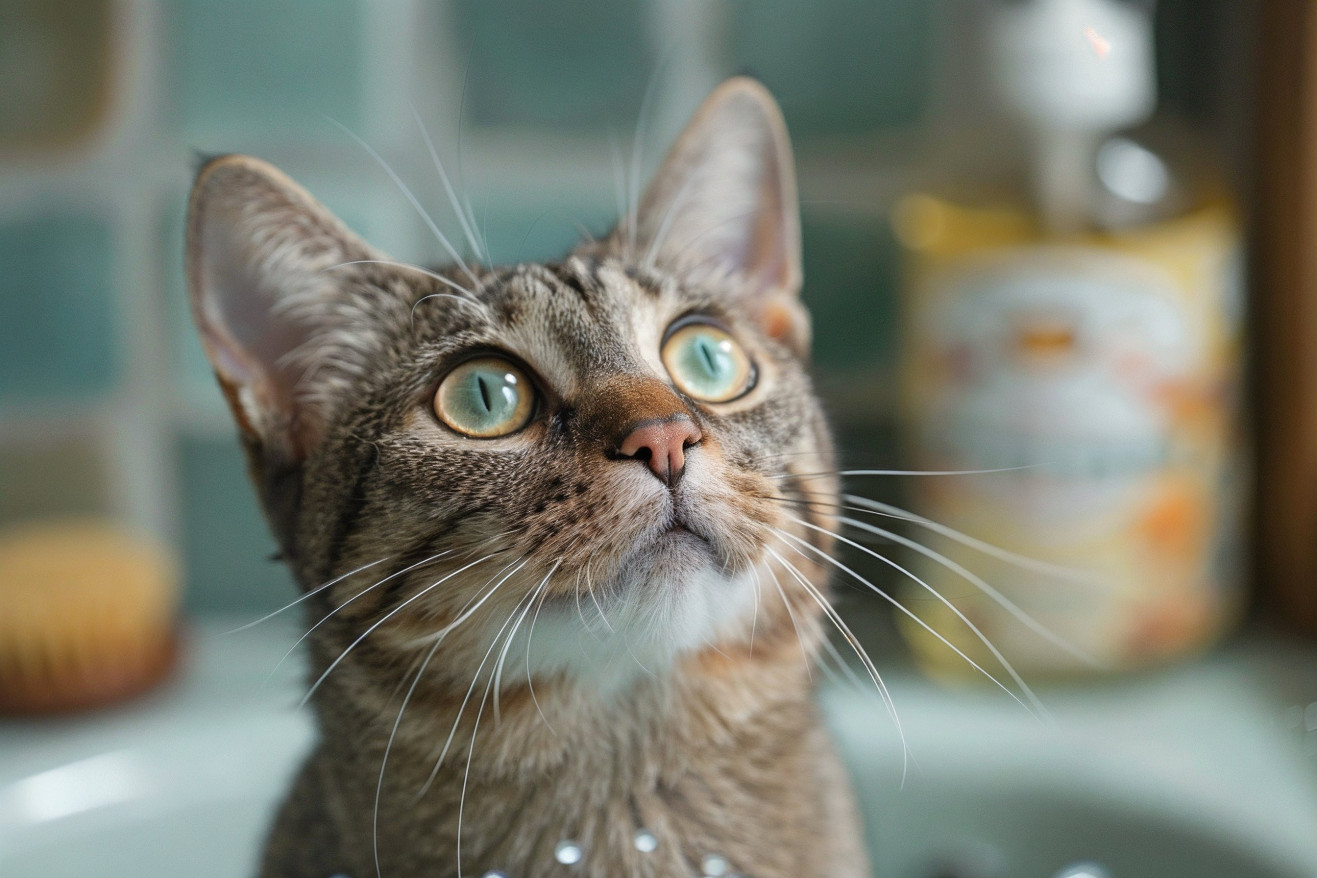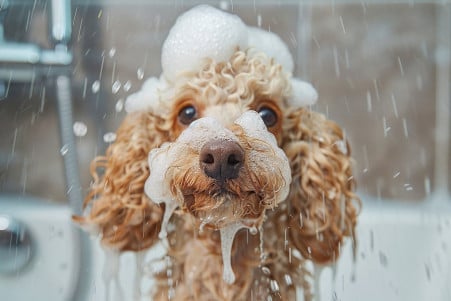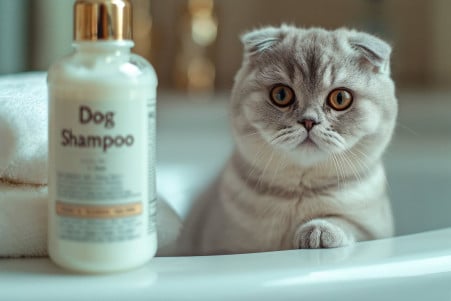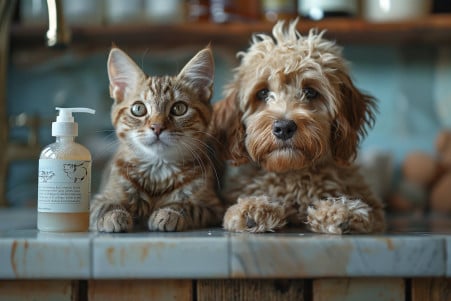Can You Use Dawn Dish Soap on Cats? Potential Dangers
30 May 2024 • Updated 29 May 2024

Dawn dish soap may be a powerful cleaning solution, but pet parents may be worried about using it around their inquisitive feline friends. This is because Dawn dish soap contains ingredients that are toxic to cats and can lead to health issues even if they are exposed to small amounts. If a cat ingests or licks Dawn dish soap or it comes into contact with their eyes, it can lead to extreme vomiting, diarrhea, and in the worst case, respiratory distress that can be fatal. As a result, it’s best to use cleaning products that are safe for pets when you have cats in the house.
In this article, we will take a deeper dive into the ingredients in Dawn that are harmful to cats. By looking at the information provided by veterinarians and toxicologists, you will get a comprehensive understanding of the dangers of using this cleaning product around your feline friend. We will also discuss alternative cleaning solutions that will help you clean up after your pets without putting your cat’s health at risk. Armed with this information, you can make choices that will help you maintain a safe and healthy living environment for your cat.
Is Dawn dish soap safe for cats?
How to Tell If a Cat Needs a Bath
Cats are known for their cleanliness, and they spend a lot of time grooming themselves by licking their fur and using their tongues to remove dirt, debris, and loose hair. However, there are some instances when a cat may need a bath.
If your cat has greasy, matted fur that's trapping dirt and debris, it may be time for a bath, according to Pounce Hawaii. In addition, older cats may not be able to groom themselves as well as they used to, and if your cat has come into contact with something smelly, like garbage or an insect, the smell can stick to their fur. If your cat is shedding a lot and is getting hairballs when they groom themselves, it may be time for a bath.
Obesity, arthritis, and other medical issues that affect a cat's ability to groom themselves are the most common reasons a cat may need a bath, according to Texas A&M University. In addition, certain breeds, like the Sphynx, are hairless and have to be bathed regularly to control the amount of oil on their skin. If your cat has fleas, mites, or ticks, which are parasites that feed on a cat's blood and can cause skin irritation, it's time for a bath.
If you notice that your cat's grooming habits have changed or that their fur looks different, it's important to talk to your vet. They can help you figure out what's going on and make sure your cat gets the care they need. You should also check your cat's fur and skin for signs that they need a bath, including matting, greasiness, a bad smell, or signs of parasites. Since some cats need help bathing more than others, it's important to keep an eye on your cat to make sure they're clean and comfortable.
How to Bathe a Cat Safely
WebMD explains that it's important to use a cat-specific shampoo when bathing your cat, as human and dog shampoos can be toxic if ingested and can dry out a cat's skin. The article also explains that cats don't sweat like humans, so the steamy hot water that many people use to bathe themselves can actually cause a cat to overheat and stress out.
To safely bathe a cat, ASPCA Pet Health Insurance suggests first acclimating the cat to the bathing area. Then, gently lower the cat into a few inches of lukewarm water, wet the fur, lather with a cat-specific shampoo, and rinse thoroughly. A soft cloth can be used to wash the face, and cotton balls can be used to clean the ears. After the bath, the cat should be towel-dried, and a hairdryer should be avoided.
WikiHow explains that if your cat has long hair or dry skin, you may want to use a cat-safe conditioner after rinsing the shampoo. The article also warns against using human and dog shampoos, which can be toxic and drying to cats. BeChewy offers more advice for keeping cats relaxed during the bathing process, including using pheromone diffusers and giving treats.
By using these safe bathing methods and the right products, you can make sure that your cat stays clean and healthy while minimizing their stress. Just make sure to talk to your vet if you have any questions or concerns about your cat's grooming routine.
How to Choose the Best Cat Shampoo
If you want to make sure that your cat's skin and coat stay healthy, it's important to choose the right shampoo. As noted by The Spruce Pets, it's best to use a cat-specific shampoo, as human and dog shampoos can be too harsh and drying for a cat's skin and fur.
According to PawPurity, the best cat shampoos will include natural ingredients like oatmeal, aloe vera, and essential oils, which can help moisturize and calm a cat's skin, especially if they're prone to dryness, dandruff, or allergies. On the other hand, you should avoid shampoos that contain sulfates, parabens, and artificial fragrances.
When you're shopping for a cat shampoo, it's important to think about your cat's specific skin and coat issues. For example, Catster explains that shampoos with colloidal oatmeal can be helpful for cats with dandruff, while hypoallergenic shampoos may be better for cats with sensitive skin. U.S. News even lists Burt's Bees Hypoallergenic Shampoo and Pro Pet Works Hypoallergenic Shampoo as two of the best options for cats with sensitive skin.
By reading the labels of different cat shampoos and choosing one that's best for your cat's unique skin and coat issues, you can help prevent dryness and irritation while keeping your cat's skin and coat in good condition. Plus, with the right cat shampoo, you can make sure that your cat feels clean and fresh.
Natural and DIY Cat Shampoo Options
Natural and DIY shampoos can be a good option for cat owners who want to avoid chemicals and synthetic fragrances. For example, 4-Legger explains that their natural cat shampoo comes with a foamer bottle that turns the concentrated formula into a shaving cream-like consistency.
Catster lists a few easy DIY cat shampoo options that use natural, soothing ingredients. Their "Moisturizing Shampoo" includes vegetable glycerin, castile soap, and essential oils to help moisturize dry skin. The "Sensitive Skin" recipe includes ground oatmeal and baking soda to help calm irritated skin. Their "Dry Shampoo" recipe involves heating oatmeal in the oven before applying it to help cats with extremely dry skin.
When making your own cat shampoos, it's important to use ingredients that won't remove the natural oils from a cat's skin and coat. As explained by U.S. News, ingredients to stay away from include sulfates, fragrances, and essential oils, all of which can irritate sensitive skin. It's also important to make sure you store and apply the shampoo properly to make sure it's still safe and effective for your cat.
If your cat hates baths, Catster recommends dry shampoos and grooming wipes as natural alternatives to traditional cat shampoos. These products can help you clean your cat without the stress of a bath.
By using natural, soothing, homemade or natural shampoo options, you can make sure your cat's skin and coat stay healthy without exposing them to harsh chemicals. Just make sure to talk to your vet if you have any concerns about your cat's grooming routine.
The Dangers of Using Dawn Dish Soap on Cats
There are several dangers associated with using Dawn dish soap on cats. Dawn is a strong detergent that is not designed for use on animals. While it can be effective at repelling fleas and ticks, it is not a good option for regular cat bathing, according to Catster. The site explains that Dawn "isn't formulated with cat skin in mind" and can remove the natural oils that are important for a cat's skin and coat.
In fact, the Hepper website warns that using Dawn on cats can lead to dry, itchy skin because the chemicals in the soap are too harsh for a cat's skin. They note that "Feline skin is more sensitive than human skin and is not meant to be exposed to harsh chemicals." In addition, if cats ingest Dawn while grooming, it can lead to stomach upset, vomiting, and diarrhea.
The dangers of using Dawn on cats are highlighted by a story shared on JustAnswer in which a cat owner said their cat started drooling excessively after a bath with Dawn, which may have been due to the cat licking areas where soap residue remained. This shows that even one use of the detergent can have negative effects on a cat's health.
Because of the potential for skin irritation, ingestion, and respiratory issues, veterinarians advise against using Dawn and other household products on cats. Instead, people should talk to their vet and use shampoos made for cats or look into natural, homemade options that won't remove important oils. The most important thing is to make sure that cats are safe and healthy during and after their baths.
Conclusion: Prioritizing Cat Safety and Wellness
This article has discussed the dangers of using Dawn dish soap on cats, which underscores the importance of using pet-safe grooming products and best practices when bathing your cat. Although Dawn can help with pest control, it can also cause problems for your cat’s skin and coat by removing the natural oils that protect them.
It’s important to work with your vet to determine the best way to bathe your cat and which products to use. Your cat’s unique medical issues, skin problems, or grooming needs may mean that you need to use medicated shampoos or other cleaning solutions. By making sure that you’re always looking out for your cat’s safety and well-being, you can make sure that they’re happy and free from discomfort when it’s time for a bath.
Keeping your cat’s coat clean and well-groomed is important for their health and happiness. However, cats are usually able to groom themselves, there may be times when you need to bathe them. When that happens, it’s important to make sure that you’re using the right products and methods to minimize stress and potential harm. By following these tips, you can make sure that your cat is comfortable, healthy, and well-groomed.


